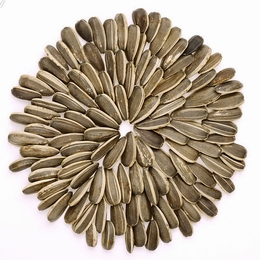 to a micronutrient research facility, people who ingest seeds and nuts regularly have a lower possibility of having heart ailments or diabetes mellitus. The health benefits of sunflower seeds are profoundly documented by Taoist anti-aging medical practitioner Dr. Mao Shing Ni. He asserts that the seeds be added to one's diet because of their significant nutritive content.
to a micronutrient research facility, people who ingest seeds and nuts regularly have a lower possibility of having heart ailments or diabetes mellitus. The health benefits of sunflower seeds are profoundly documented by Taoist anti-aging medical practitioner Dr. Mao Shing Ni. He asserts that the seeds be added to one's diet because of their significant nutritive content.Nutrition content of sunflower seeds
The seeds contain Vitamin E.
This can help protect cells against the effects of free radicals and substances that oxidize and harm protein structure, the cell membranes, including DNA (deoxyribonucleic acid). This nutrient also helps in the maintenance of blood circulation and production of red blood cells (RBCs). One ounce of sunflower seeds has a total of 10 mg of vitamin E in it. Fact sheets for dietary supplements indicate this is already 35 percent of a person's recommended daily requirement of Vitamin E.
Other health benefits are attributed to the seeds' content of Thiamine, a B-vitamin.
This nutrient functions to stimulate cell catalysts or enzymes to stimulate chemical reactions that cells require in order to work efficiently. When a person has adequate levels of thiamine in the body, this assists in obtaining energy from food and generates the basic units or nucleic acids that comprise human DNA. An average human male requires 1.2 mg of Vitamin B1 daily while a female requires 1.1 mg. Every ounce of sunflower seeds contains 0.4 mg of thiamin or Vitamin B1.
Sunflower seeds also contain copper.
This mineral is excellent for maintaining the skin and hair. One ounce of the seeds contains 512 mg of copper or more than fifty percent of the recommended daily intake of this nutrient. The body utilizes copper to produce melanin responsible for giving the hair and skin their nice healthy colors. The minute particles of this protein pigment can take in the sun's ultraviolet radiation. In this way, people are protected from damaged tissues due to overexposure to sunlight. Copper also supports the mechanism of the body's metabolic processes to assist body cells in producing energy.
To sum up
Including sunflower seeds in your daily diet regimen is very easy. Aside from eating seeds in raw form, you can just mix an ounce of the seeds in your cold or hot beverage or sprinkle them over salads and other food servings. You can even eat these with a sandwich, a bowl of oatmeal, breakfast cereal, or with a cup of non-dairy ice cream or yogurt. Another way to incorporate sunflower seeds to your meals is by soaking them in water and then later on combining it with your pureed soup. This not only fortifies the food with essential nutrients but it also adds a hint of flavor and nice texture to the food. There are numerous ways to get more sunflower seeds and thus consume more of the nutrients needed by the body.





